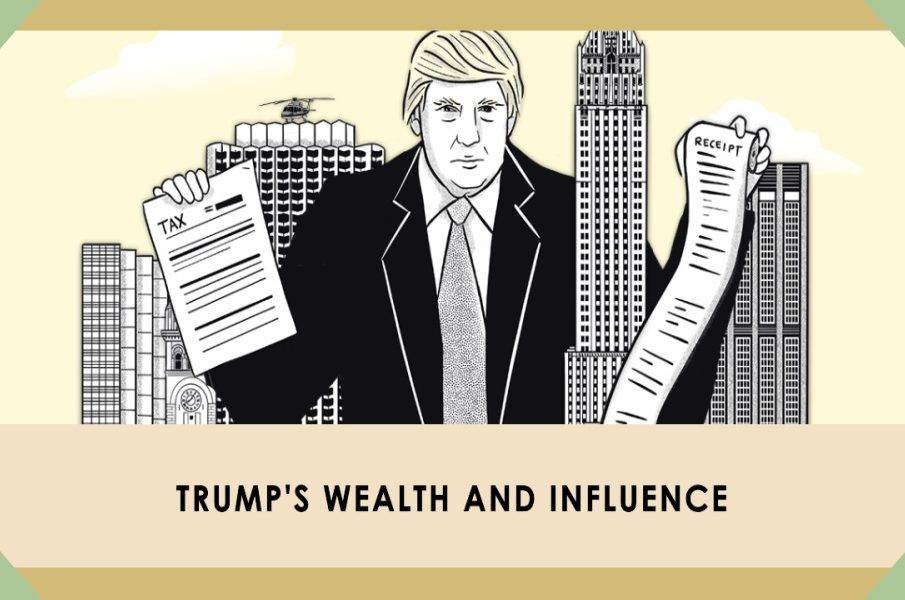Donald Trump Net Worth Unveiled: Fact vs Fiction

Donald Trump’s net worth has been a topic of intrigue and debate for years. From real estate mogul to the 45th President of the United States, Trump’s financial journey has been as flamboyant as his personality. With figures fluctuating over time, and sources like Forbes and Celebrity Net Worth offering varying estimates, pinning down an exact number has proven challenging.
This article dives into the rollercoaster ride of Trump’s wealth, exploring how his net worth has changed from his early days in his family’s real estate empire to his recent years in the political spotlight. It’s a tale of billions, lawsuits, and the value of a brand, all wrapped up in the enigmatic figure of Donald Trump. Keep reading to unravel the complexities of Trump’s financial standings.
Donald Trump’s Early Life and Career
Childhood and Education
Born into a family with a robust real estate background, Donald Trump was steeped in the industry from a young age. Elizabeth Trump and Son, the company co-founded by his grandmother, played a crucial role in shaping his early understanding of the business. As a child, Donald’s millionaire status was more than theoretical, with shares in his father’s company allotted to him when he was merely eight years old. His formal education in economics from The Wharton School of the University of Pennsylvania armed him with the knowledge he’d later use to expand the family business and venture into numerous personal projects.
Early Business Ventures
Trump’s initial steps into the business world were marked by significant financial support from his family. Trust funds established by Fred Trump rendered Donald a millionaire in equivalent today’s dollars, and yearly dividends from the family’s real estate ventures provided a stream of income. His early business ventures began with work at his father’s company, which would eventually evolve into the famed Trump Organization. Forestalling a common professional trajectory, Trump ambitiously moved the family empire’s focus from the outer boroughs of New York City to the heart of Manhattan.
Real Estate Empire
Trump’s real estate ventures were bold and often intertwined with the socio-economic climate of the time. One of his notable early successes was the transformative renovation of the Commodore Hotel during New York’s financial downturn in the ’70s. The Trump Organization’s $100 million investment breathed new life into the property, culminating in a resoundingly positive impact on the city. The success of this project demonstrated Trump’s capacity to leverage opportune moments in real estate, a precedent for his future dealings within and beyond the industry. As part of his aggressive expansion strategy, Fred Trump’s loans to Donald for various projects underscore the intertwined nature of family support in the burgeoning empire.
The Rise and Fall of Trump’s Businesses
Casino and Hotel Ventures
Venturing beyond New York, Donald Trump set his sights on Atlantic City in the late 1980s, seeing an opportunity to dominate a burgeoning gaming hub. Trump Taj Mahal Casino, a crowning achievement at the time, opened its doors in 1990, touting itself as the pinnacle of luxury and entertainment. Despite the initial grandeur, Trump’s casinos faced financial turmoil, necessitating several bailouts from his familial support structure. The spectacle of the opulent 64-story tower on Las Vegas Boulevard—without a casino but with its distinctive 24-karat-gold-infused glass—has become an emblematic part of Trump’s real estate portfolio. Below are some details about the Las Vegas property’s offerings:
- Five-star guest rooms: 339 units
- Hotel condominiums: Spread across 11 floors
- Five-bedroom penthouses: Located on floors 29 to 89
- Indoor pool: 22.8 meters
- Spa: Measuring 2,136 square meters
Bankruptcies and Financial Struggles
Despite early successes, such as the Commodore Hotel renovation, Trump’s economic prowess was tested by the string of bankruptcies within his casino and resort ventures, notably between 1991 and 2009. These ventures seemed resistant to profit and revealed vulnerabilities in business strategies that required intervention in the form of financial restructuring. As Trump faced personal and professional financial struggles, solutions included leveraging his properties and reputation to secure favorable loan terms from entities such as Deutsche Bank. These agreements were not without their stipulations, with the bank setting benchmarks for net worth and liquidity as conditions for loan approval.
The Revival of Trump’s Brand
The rejuvenation of Trump’s brand was evidenced by his 1976 renovation success with the Grand Hyatt New York, which showcased his potential to reinvigorate properties and revitalize surrounding areas. Selling his 50% stake in the building to his partners in 1996 for $142 million reflects Trump’s ability to capitalize on his investments. Amidst the numerous financial hurdles, the Trump Organization continued to maintain a streak of punctual interest payments, as per the company’s declaration, which painted a picture of reliability in spite of previous bankruptcies. The organization’s persistence in the face of challenges and its apparent ability to uphold its financial obligations contributes to the ebb and flow of Trump’s business credibility.
Analyzing Donald Trump’s Net Worth
Estimations and Discrepancies
Donald Trump’s reported net worth has been a subject of debate and complex analysis over the years. His personal wealth estimation released in June 2015 stated a figure between $8 – 10 billion which starkly contrasted with valuations from other analysts. A significant reason for this disparity lies in Trump’s valuation of his personal brand. Trump placed a $3.3 billion worth on his brand, while other estimates suggest a valuation closer to $50 to $100 million. Experts from the attorney general’s office have conducted extensive evaluations, concluding that Trump’s net worth had been overstated by billions. For seven consecutive years, starting in 2013, misrepresentations allegedly inflated his statement of financial condition by over $3 billion annually.
Assets and Investments
Amidst the scrutiny, Trump’s disclosed assets and investments showcased his financial footprint across various sectors. In May 2016, his personal financial disclosure reflected at least $1.4 billion in assets, suggesting significant holdings. These assets encompassed an array of golf courses, resorts, and properties worldwide, generating sizable sums. His ventures include:
- $300 million in income from golf courses and resorts
- $100 million in rental income
Notably, the Trump Organization’s deal in 2022 saw the sale of the Trump International Hotel in Washington, D.C., yielding a considerable $375 million. Furthermore, refinancing in San Francisco and liquid assets placed Trump’s cash reserves at $375 million, with a segment of this figure arising from the mentioned building’s refinancing proceeds.
Debt and Liabilities
Understanding Trump’s net worth also necessitates examining his debt and liability portfolio. With loans centered on projects in prime locations like Florida, Chicago, and Washington, D.C., financial scrutiny intensified. Deutsche Bank, before agreeing to these loan terms, assessed Trump’s financial statements through its private banking branch, possibly yielding more advantageous interest rates than from its commercial real estate division. The New York Attorney General’s lawsuit highlights Trump’s financial statements as key points of contention, accusing them of significant overvaluation. In 2014 alone, the discrepancy between reported assets of $6.7 billion and the attorney general’s estimate exceeded $2.2 billion.
Everything that Donald Trump Owns
Trump’s wealth is just as diversified as his businesses. The sum total of Trump’s ownership spans a widespread collection of assets including properties, investments, and various business ventures. From luxurious hotels to renowned golf resorts, Trump’s portfolio signals a vast empire with tangible and intangible assets at its core. Overlooking the complexities of his financial situation, it’s undeniable that Trump’s holdings are far-reaching, with his ventures spanning continents and sectors. Whether it’s iconic skyscrapers or private estates, each asset contributes to the mosaic that compiles the story of Trump’s wealth.
Controversies Surrounding Trump’s Wealth
Tax Returns and Financial Transparency
The public’s interest in the financial dealings of former President Donald Trump has been unrelenting, particularly regarding his tax returns and the broader transparency of his wealth. His refusal to voluntarily release his tax returns broke long-standing political norms and fueled speculation about the contents and what they might reveal about his financial affairs. Scrutiny intensified during his presidential campaign and subsequent tenure in the White House.
Despite repeated promises, Trump cited ongoing audits as the reason for not disclosing his tax returns, a claim that clashed with IRS statements indicating that audits do not prohibit individuals from releasing their tax information. This ongoing opacity has raised numerous questions about the real state of his wealth and financial practices.
Allegations of Inflating Net Worth
In the complex tapestry of Trump’s financial narrative, allegations have surfaced that he and his organizations systematically overvalued assets to inflate his net worth significantly. Reports suggest a possible inflation of billions of dollars, with claims his net worth was overstated by over $2 billion in a single year, captured by media and legal investigations.
Michael Cohen, Trump’s former attorney, testified to what he characterized as recurrent overstatements of asset valuations. These accounts suggest that Trump’s wealth, while undoubtedly substantial, may have been artificially amplified, calling into question the reliability and integrity of his financial assertions.
Lawsuits and Business Failures
The financial history of Trump’s empire is dotted with business pitfalls and legal challenges, only adding to the controversies regarding his net worth. His ventures, particularly in Atlantic City, encountered significant financial distress, forcing some entities into bankruptcy. These business failures cast a shadow over his reputation as a business mogul.
Furthermore, Trump’s business practices and financial statements have become the subject of legal scrutiny. With multiple civil lawsuits filed against him and his organization, alleging fraudulent activities tied to the reported value of his assets, the complexities of Trump’s finances remain under the lens of judicial examination. These litigations, compounded with past business failures, paint a turbulent picture of his purported wealth and business acumen.
Why Is Donald Trump Off the Forbes 400 List?
Donald Trump’s fluctuating wealth has been under scrutiny, particularly with his absence from the Forbes 400 list. In 1982, Trump, alongside his brother Fred, was featured on the prestigious list with a net worth of $200 million. When considering inflation, this amount equates to about $500 million in today’s dollars. However, recent developments have seen Trump’s fortune dwindle, prompting his descent from the ranks of America’s wealthiest.
This year, Trump’s net worth saw a significant decrease of $600 million, as reported by Forbes. This substantial decline was largely attributed to the financial performance of his business ventures, chief among them Truth Social. The platform’s challenges and the resultant financial losses played a crucial role in this downturn.
| Year | Net Worth Decline |
|---|---|
| current | $600 million |
It’s crucial to understand that the Forbes 400 list is more than just a catalog of wealth; it’s an emblem of financial success and a benchmark for the ultra-rich. Donald Trump’s history with the list is complex as he has long been reputed to be fixated on his placement, often disputing Forbes’ assessments of his wealth. In light of this, being dropped from the list isn’t just a monetary setback but also a blow to his publicly perceived financial reputation.
Moreover, Trump’s past appearances on the list were tied not only to his own business acumen but also his inheritance. By the time Fred Trump passed away in 1999, each Trump sibling had inherited around $413 million both in inheritance and dividends after adjusting for inflation. Nonetheless, personal success seemed to be measured by self-made wealth, a narrative that Trump often espoused.
The implications of falling off the Forbes 400 resonate beyond personal vanity. It’s an indicant of changing tides in business success and marks a shift in the enduring narrative of wealth and influence that Trump has cultivated over the years. The Forbes 400 list continues to be a barometer for financial stature, and its exclusion of Trump suggests a recalibration in the perceptions of his business prowess.
Trump’s Net Worth in the Political Arena
Presidential Campaign Spending
Throughout their campaign endeavors, presidential candidates often allocate significant portions of their fortune to finance campaign activities—a trend that did not elude Donald Trump. His presidential campaign in 2015 claimed a net worth ranging between $8 and $10 billion, with a substantial value attributed to the personal brand. Regardless, this self-estimated figure diverged from analysts’ assessments, who valued Trump’s brand markedly lower, at around $50 to $100 million. The expenditure made during Trump’s campaign trail was partly an investment into his own candidacy, reflecting a complex interplay between personal wealth and political aspirations.
Impact of Presidency on Net Worth
Once in office, the financial status of a president can undergo significant changes, and for Trump, this was no exception. Forbes noted fluctuations in Trump’s net worth, peaking at $4.5 billion in 2017 before a decline to $3 billion in 2019. These variations were attributed to the devaluation of Trump’s brand and real estate holdings as a consequence of his personal controversies. Conversely, Fortune Magazine reported a net worth increase to $3.3 billion, suggesting that the presidency had, in fact, bolstered Trump’s financial stature. The impact of his presidential term on his portfolio remains a point of contention among financial analysts.
Post-Presidency Ventures
Following his presidency, Trump ventured back into the business domain with ventures both aligned and divergent from his previous endeavors. As is often the case with former presidents, the opportunity to capitalize on their tenure’s prestige presents itself in various forms. For Trump, this included continuing to manage his vast array of properties and also embarking on new projects like Truth Social. Despite initial high expectations, the value of this venture has been cited as a key factor in the notable decrease in his wealth, as reported by Forbes—a revelation that has further complicated the assessment of Trump’s true financial conditions post-presidency.
Conclusion
Donald Trump’s net worth has long been a subject of intrigue and controversy. His ability to bounce back from financial setbacks and maintain a reputation for wealth, despite numerous business challenges, is a testament to his resilience. Yet the shifting sands of his fortunes, particularly in light of the struggles faced by Truth Social and the impact of his political career, have led to a reevaluation of his financial status. Trump’s journey from real estate scion to a figure of political power reflects a complex narrative where his economic aptitude has been both lauded and questioned. As the debate over his true net worth continues, it’s clear that Trump’s financial legacy is as multifaceted as the man himself.
Frequently Asked Questions
What influenced Donald Trump’s early career in real estate?
Trump’s early career was heavily influenced by his family’s real estate background, particularly his work at his father’s company, where he gained initial business experience and expertise.
What was one of Trump’s early successful projects?
One of Trump’s early successful projects was the renovation of the Commodore Hotel, which was transformed under his direction into the Grand Hyatt New York, showcasing his ability to revitalize properties.
How did the Trump Taj Mahal Casino impact Trump’s finances?
The Trump Taj Mahal Casino in Atlantic City faced significant financial turmoil, requiring bailouts and eventually contributing to the financial struggles and bankruptcies in Trump’s casino ventures.
What controversies surround Trump’s wealth?
Controversies surrounding Trump’s wealth include his refusal to release his tax returns, allegations of inflating his net worth, and various lawsuits and business failures that question the reliability of his financial claims.
How has Trump’s net worth been affected by his business ventures?
Trump’s net worth has been significantly affected by the financial performance of his business ventures, including the struggling social media platform Truth Social, leading to his drop from the Forbes 400 list.
What impact did Trump’s presidency have on his net worth?
Trump’s net worth saw a notable decrease during and after his presidency, impacted by his presidential campaign spending and the varying performances of his post-presidency ventures.










